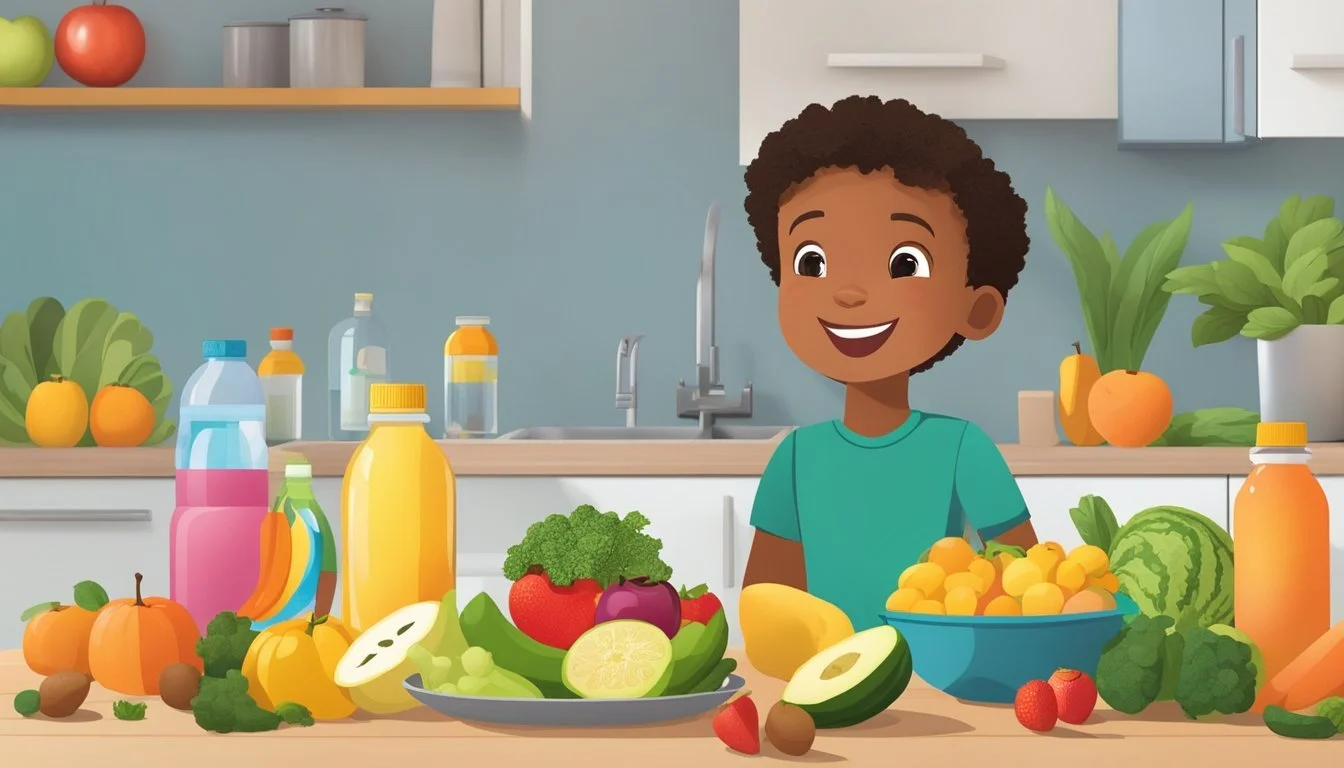Kid-Friendly Foods to Ease Constipation: Helping Your 5-Year-Old Stay Regular
Constipation in children can be a common yet distressing issue for both kids and their parents. Effective dietary choices can play a significant role in alleviating this discomfort. Making informed decisions about which foods to include in a child's diet can help improve bowel movements and overall digestive health.
Certain foods can act as natural laxatives, promoting regularity and easing constipation in young children. This article will discuss appropriate dietary options for a 5-year-old, aiming to ensure their digestive system functions smoothly and to provide parents with practical solutions for enhancing their child's digestive wellness.
1) Prunes
Prunes are a natural and effective way to help children with constipation. They are rich in dietary fiber, which aids in bowel movements. For a 5-year-old, prunes can be both a tasty and practical option.
Prunes contain sorbitol, a natural laxative that helps soften stools. This can make it easier for children to pass bowel movements without discomfort. Including prunes in a child's diet can promote regularity.
If a child is not fond of eating whole prunes, prune juice serves as a great alternative. Mixing prune juice into a smoothie or even adding a small amount to milk can be very effective. This method often makes the taste more acceptable for kids.
An ounce of prune juice can make a significant difference. Parents often find that incorporating prunes or prune juice into their child's diet can quickly alleviate constipation symptoms.
Parents should monitor how their child responds to prunes. It's essential to ensure they are not consuming too much at once, which can sometimes lead to stomach discomfort. Starting with small portions and gradually increasing can help determine the right amount needed to maintain regular bowel movements.
2) Oatmeal
Oatmeal is a fantastic option to help a 5-year-old with constipation. Its high fiber content can aid in promoting bowel regularity. A single packet of plain oatmeal can provide a substantial amount of dietary fiber, which is essential for a healthy digestive system.
The soluble fiber in oatmeal absorbs water, which helps to soften stool and makes it easier to pass. Adding fruits like bananas or berries to oatmeal can boost its fiber content even more. This not only enhances the nutritional value but also makes the meal more appealing to kids.
Oatmeal is also versatile and can be incorporated into various meals. It can be served as a warm breakfast cereal, added to smoothies, or even used in baked goods.
For parents, preparing oatmeal is simple, making it a convenient choice for a busy household. When introducing oatmeal, it's essential to ensure that it is plain and not laden with added sugars or artificial flavors.
3) Pears
Pears are a beneficial fruit for children struggling with constipation. They are rich in fiber, which aids in digestion and helps to soften stool. This can make it easier for a child to have regular bowel movements.
The natural sugars in pears, such as sorbitol and fructose, also play a role. Sorbitol acts as a mild laxative by drawing water into the intestines, which softens the stool. This can help relieve constipation in a gentle and natural way.
Pears can be served in various forms to make them appealing to a child. Fresh pears can be sliced and served as a snack, or they can be added to salads and smoothies. Pear juice is another option but should be served in moderation due to its high sugar content.
When choosing pears, it is advisable to select ripe ones for the best results, as they contain higher levels of sorbitol. Additionally, keeping the skin on provides extra fiber, which is beneficial for digestion.
4) Broccoli
Broccoli is an excellent choice for helping a 5-year-old child with constipation. Rich in fiber, it can aid in bowel movements by adding bulk to the stool.
Parents can prepare broccoli in various ways to make it appealing for young children. Steaming the broccoli until soft and then cutting it into bite-sized pieces is a good option.
Some children may prefer blended broccoli mixed into other dishes, such as brown rice or pasta. Incorporating broccoli into familiar meals can help increase a child's fiber intake without much resistance.
Broccoli is also packed with essential vitamins such as Vitamin C, Vitamin K, and folate, which contribute to overall digestive health. Sulforaphane found in broccoli may additionally support gut health and digestion.
It's important to ensure that the broccoli is well-cooked to prevent choking hazards and to help with easier digestion. Encouraging children to drink plenty of water alongside fiber-rich foods like broccoli can further aid in relieving constipation.
5) Sweet Potatoes
Sweet potatoes are an excellent food for helping a 5-year-old with constipation.
They are rich in dietary fiber, which helps promote healthy bowel movements. A medium-sized sweet potato with the skin on provides around four grams of fiber. This fiber content can aid in keeping stools soft and easier to pass.
Additionally, sweet potatoes contain both soluble and insoluble fiber. Soluble fiber can help absorb water, making stools bulkier and preventing constipation. Insoluble fiber adds bulk to the stool, aiding its movement through the digestive tract.
Sweet potatoes are also packed with vitamins and minerals like vitamin A, vitamin C, and potassium. These nutrients contribute to overall digestive health.
Including sweet potatoes in a child's diet is simple and versatile. They can be baked, mashed, or roasted. Even sweet potato fries with the skin on can be a tasty, fiber-rich option.
For added variety, consider mashing sweet potatoes and mixing them with other fiber-rich foods like carrots or peas. Creating appealing and nutritious meals can encourage children to eat more of these beneficial vegetables.
Common Causes of Constipation in Children
Constipation in children can be influenced by various factors including diet, physical activity, and hydration levels. Understanding these causes helps in addressing and preventing constipation effectively.
Dietary Factors
Constipation in children often correlates with their dietary habits. Intake of foods low in fiber can lead to harder stools that are difficult to pass. Fiber, found in fruits, vegetables, and whole grains, is crucial for healthy bowel movements.
Excessive consumption of dairy products like cheese and milk can also contribute to constipation. Limiting these foods may alleviate symptoms. Some processed foods, rich in fat and sugar but low in fiber, can slow down the digestive process, making stools firmer and less frequent.
Lack of Physical Activity
Regular physical activity promotes healthy digestion and can prevent constipation. When children engage in physical exercise, it stimulates intestinal muscles aiding in bowel movements. Sedentary lifestyles, particularly those involving prolonged sitting or inactivity, can lead to slower digestive transit times.
Incorporating activities such as playing outside, riding a bicycle, or participating in sports can substantially decrease the risk of constipation. The key is consistent daily movement, which helps keep the digestive system active and functioning smoothly.
Hydration Levels
Adequate water intake is essential for preventing constipation. Water helps soften stools and promotes easier passage through the intestines. Children who don't drink enough fluids may experience hard, dry, and painful bowel movements.
Recommendations for daily fluid intake vary by age, but ensuring a child drinks water throughout the day is crucial. For instance, 5-year-olds typically require around 45-50 ounces of fluids daily. Encouraging your child to drink water rather than sugary beverages can help maintain proper hydration levels and support healthy digestion.
The Role of Fiber in Digestive Health
Eating the right types and amounts of fiber is crucial for children's digestive health. This section will explain the different types of fiber and provide guidelines for recommended fiber intake for children.
Types of Fiber
There are two main types of dietary fiber: soluble and insoluble. Soluble fiber dissolves in water to form a gel-like substance. It helps in lowering cholesterol levels and regulating blood sugar. Foods high in soluble fiber include oats, apples, and beans.
Insoluble fiber does not dissolve in water. It adds bulk to the stool and helps food pass more quickly through the stomach and intestines. Whole grains, nuts, and vegetables are good sources of insoluble fiber.
Including both types of fiber in a child's diet is important to maintain healthy digestion and prevent constipation.
Recommended Fiber Intake for Children
Children need different amounts of fiber depending on their age. A simple guideline for children is to add 5 to their age to determine the daily grams of fiber needed.
For a 5-year-old, this means they need about 10 grams of fiber each day. Foods like fruits, vegetables, and whole grains can help meet these requirements. Ensuring children eat at least 5 servings of fruits and vegetables daily can help achieve this intake.
Gradually increasing fiber intake is important to avoid digestive discomfort. Encouraging a balanced diet with a variety of high-fiber foods is essential for promoting regular bowel movements and overall digestive health.
Importance of Hydration
Proper hydration is crucial for maintaining digestive health and preventing constipation in children. Ensuring that children drink enough fluids can help keep their stools soft and promote regular bowel movements.
Best Liquids for Digestion
Water is the most effective beverage for aiding digestion and preventing constipation. Children should drink 6 to 8 glasses of water daily. In addition, incorporating drinks like fruit juices (e.g., apple or prune juice) can provide additional hydration and fiber, which can help soften stools.
Another option is milk; however, overconsumption may lead to constipation, so it should be balanced with other fluids. Herbal teas like chamomile or peppermint can also be beneficial and soothing for the digestive system.
Signs of Dehydration in Children
Dehydration can exacerbate constipation, so it's essential to recognize its signs. Dry mouth, infrequent urination, and dark-colored urine can indicate that a child isn't getting enough fluids. Additionally, fatigue, dizziness, and crying without tears are more severe signs of dehydration.
Parents should monitor their child's fluid intake and ensure they are drinking throughout the day. Keeping track of these signs can help prevent dehydration and its associated health issues.






